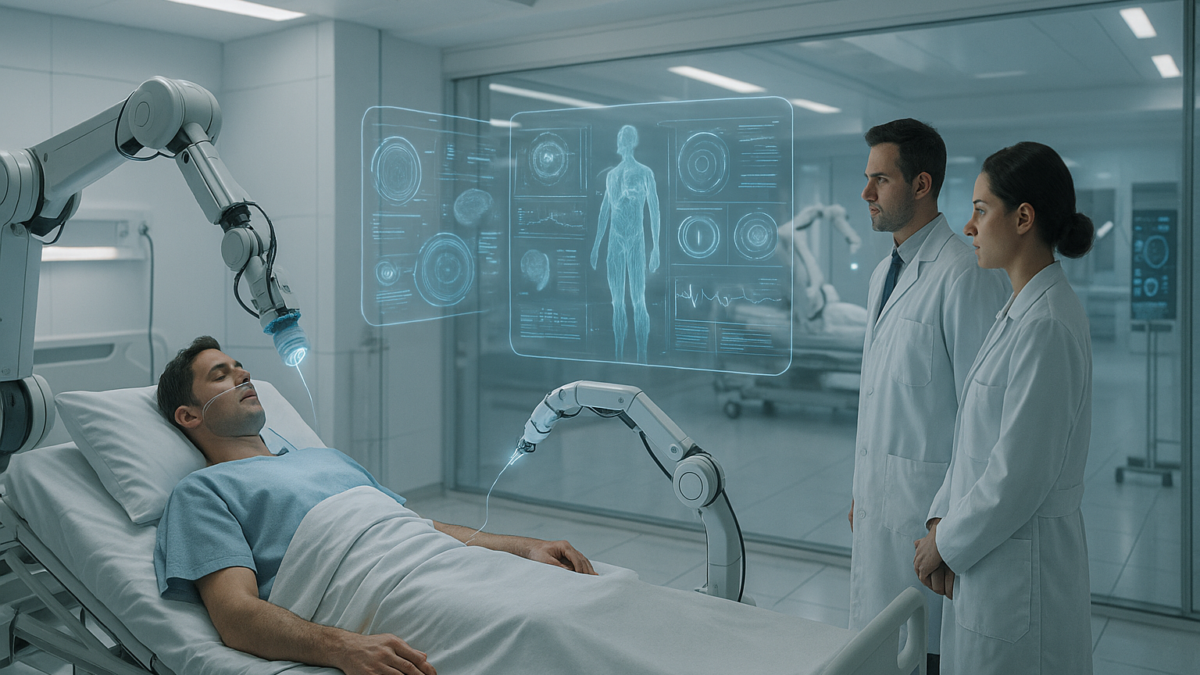Table of Contents
Introduction
The integration of Artificial Intelligence (AI) into Medical Technology (MedTech) is redefining the future of healthcare. From early disease detection and robotic surgery to predictive analytics and personalized treatment plans, AI is accelerating innovation and improving patient outcomes.
In this blog, we’ll explore how AI is reshaping MedTech in 2025, its applications, benefits, real-world examples, and challenges that lie ahead.
What is AI in MedTech?
AI in MedTech refers to the use of machine learning, natural language processing, and computer vision to enhance medical devices, diagnostics, treatment procedures, and hospital operations. It enables machines to simulate human intelligence and analyze complex medical data with speed and accuracy.
The MedTech sector, known for innovation in devices like wearables, imaging machines, and surgical tools, now leverages AI to make these technologies smarter, more efficient, and patient-centric.
Key Applications of AI in MedTech
Diagnostics & Imaging
AI algorithms can detect anomalies in medical scans such as X-rays, MRIs, and CTs more accurately than traditional methods.
- Example: Google’s DeepMind outperformed radiologists in breast cancer detection with over 89% accuracy.
- AI tools can flag early signs of diseases like cancer, diabetes, or neurological disorders faster, enabling timely intervention.
Robotic Surgery
AI-powered robotic systems assist surgeons in performing complex procedures with precision.
- Robotic arms use real-time data and AI to reduce human error and shorten recovery times.
- Example: Intuitive Surgical’ s da Vinci system has performed over 10 million robotic-assisted surgeries worldwide.
Remote Monitoring & Wearables
Smart wearable devices track patient vitals in real time, predicting potential health issues before they escalate.
- Devices like smartwatches and glucose monitors now use AI to provide insights into sleep patterns, heart rate, and blood sugar.
- These AI-based systems alert doctors to irregularities, reducing emergency visits.
Personalized Treatment Plans
AI helps analyze genetic data, lifestyle factors, and medical history to tailor personalized treatments.
- Oncology is a major beneficiary, where AI helps design targeted cancer therapies based on an individual’s tumor genetics.
- IBM Watson Health has demonstrated success in recommending personalized cancer treatments with evidence-based support.
Predictive Analytics in Hospitals
Hospitals use AI to predict patient admissions, ICU bed requirements, and supply chain logistics.
- AI models forecast patient needs, allowing better resource management.
- Example: Cleveland Clinic used predictive models to reduce ER waiting time by 22%.
Real-World Impact & Statistics
- The global AI in healthcare market is projected to reach $187 billion by 2030 (source: Statista).
- Over 45% of MedTech companies have already integrated AI into their product lines (source: McKinsey).
- AI-driven diagnostics reduce the time to diagnosis by up to 70%, saving lives and costs.
Challenges in AI Adoption
Despite its promise, AI in MedTech comes with challenges:
- Data Privacy & Security: AI relies on vast amounts of patient data, raising concerns about HIPAA compliance, cybersecurity, and consent.
- Regulatory Barriers: AI-based medical devices must meet strict regulatory standards from bodies like the FDA and EMA, which are still evolving for AI-driven tools.
- Bias in Algorithms: If trained on biased datasets, AI systems can lead to incorrect diagnoses or treatment disparities.
- Cost & Integration: High implementation costs and integration with legacy systems pose obstacles for small clinics and developing regions.
Future of AI in MedTech
In 2025 and beyond, AI is expected to:
- Enable autonomous diagnostics in low-resource settings
- Support virtual hospitals with remote AI doctors
- Enhance neural interfaces for brain-computer communication
- Empower drug discovery using AI-based simulations
With advancements in federated learning, AI models can be trained across decentralized datasets without compromising privacy—making MedTech smarter and safer.
Final Thoughts & CTA
AI in MedTech is more than a technological trend—it’s a healthcare revolution. As we move into a more connected and personalized era of medicine, AI will play a central role in diagnosis, treatment, and patient care.
Is your healthcare organization AI-ready?
Stay ahead of the curve—explore MedTech innovations, partner with AI-driven platforms, and embrace the future of smart healthcare.
👉 For more insights into MedTech trends, subscribe to iTMunch and follow our updates on healthcare innovation.
You May Also Like: Blockchain for Good: How Decentralized Technology Is Transforming Charity and Philanthropy





